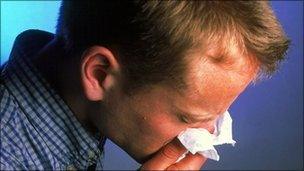Chief medical officer urges swine flu virus calm
- Published

The Public Health Agency has urged people to take sensible precautions to help prevent the spread of the virus
The NI chief medical officer has sought to reassure parents of healthy children that there is no need for alarm over the swine flu outbreak.
Dr Michael McBride was speaking after two children, who had been suffering from the H1N1 virus, died.
The death of a 10-month-old baby boy, who had an underlying health condition, was announced just hours after it was revealed a two-year-old boy had died.
It is not known if the two-year-old had any other health issues.
Active review
Nineteen people have now died in NI after suffering from the virus.
Two of those have now been confirmed to have had no other health problems.
Vaccines against the virus are currently only available to people in certain at risk groups.
Dr McBride passed on his sympathies to the families of those who died.
However he stressed that under fives in NI were not at any greater risk than other age groups.
"We continue to offer vaccinations to any child under five in an at risk group as advised by the joint committee.
"The question has been posed if we should extend to healthy under-5s.
"I know the JCVI is keeping this under close and active review and we will continue to be guided by their expert advice."
Dr McBride said there was no evidence that NI has a disproportionately higher number of deaths from swine flu compared with the rest of the UK.
He said the fact that NI has five hospitals reporting to a central laboratory could mean that the reporting of deaths was happening in a more timely manner than elsewhere.
Public anxiety
The health minister, Michael McGimpsey, said he understood the news might heighten public anxiety particularly among parents of young children.
He added: "I have recently spoken to other UK health ministers about Northern Ireland's current flu picture. I have also spoken to Mary Harney, the Republic of Ireland's health minister.
"In addition, I have consulted with the Joint Committee on Vaccination and Immunisation (JCVI) about the particular circumstances here.
"They do not recommend extending the vaccination programme beyond the current at risk groups."
During the pandemic last year, 19 people died from the H1N1 virus, all but one of whom had an underlying condition.
The authorities were unable to establish whether the other victim, a pregnant woman, had an unknown underlying health problem which may have contributed to her death.
- Published13 January 2011
- Published13 January 2011
- Published5 January 2011
- Published4 January 2011
- Published2 January 2011
- Published30 December 2010